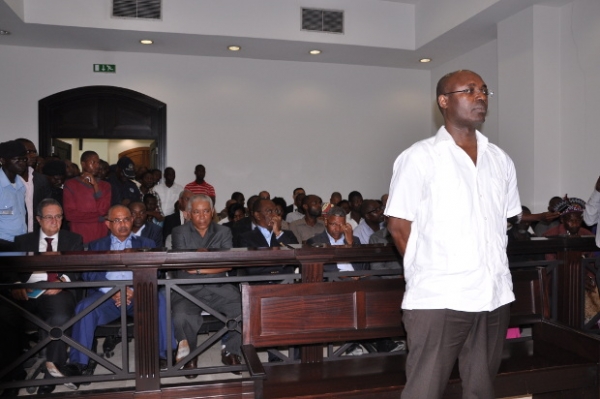

Rafael Marques de Morais exposed murder and torture by military generals in a 2011 book. The generals are suing him. De Morais faces prison time if he loses the case.
27 March 2015
The defamation trial of Angolan journalist Rafael Marques de Morais, accused of libelling seven of the country’s military generals in a book he wrote, kicked off in Luanda on Tuesday. The generals are suing him for defamation – which could cost him $1.2-million in damages and nine years in prison — after he had asked for them to be investigated for human rights abuses he first exposed in a book.
In his 2011 book Blood Diamonds: Torture and Corruption in Angola, Marques de Morais exposed more than 500 cases of torture and 100 cases of murders which allegedly happened in 18 months of the villagers in the Caungo and Xa`-Muteba district in Lunda Norte in North-East Angola.
The seven generals are allegedly shareholders in mining company SMC involved in mining in the area, and security company Teleservice, which allegedly participated in the abuses.
As the Tuesday trial started, Margues de Morais handed free copies of the book to the court. But soon after that the prosecutor argued that the trial should be held in camera because the publicity from the book and trial would reflect negatively on the generals. He said according to the penal code, defamation cases are not to be held publicly. Members of the public were then asked to leave the courtroom.
The case was adjourned to 23 April as the jury asked for more time to assess the defence arguments. Activists who had gathered outside the court were reportedly harassed by the police and dispersed.
In November 2011 Margues de Morais filed a case with the Angolan attorney general in which he called on the authorities to investigate the moral responsibility of the shareholders. In 2012 the case was set aside after which in November of the same year, the seven generals went to a court in Portugal and attempted to sue Margues de Morais and his publisher, Tina-da-China, for libel and defamation, but the Portuguese attorney general dismissed the case for lack of evidence saying the accusations in the book were well-researched.
After that failure in April 2013 the generals then turned to the Angolan justice system filing 11 charges, among them defamation, against the journalist. The department for the combating of organized crime of the National Criminal Investigation Directorate then named Margues de Morais as an official suspect under that investigation.
The latest charges drafted by the Angolan attorney general are on the basis that Margues de Morais defamed the generals in his 2011 case filed with the attorney general.
In an article published by the UK Guardian on Monday, Margues de Morais wrote about the difficulty he has experienced as a journalist in Angola, detailing his arrest in 1999 for calling President Jose Eduardo dos Santos a dictator.
He told the Mail & Guardian this week that he does not understand why the courts needed more than 100 policemen to guard him during the trial as if he was a criminal.
Corrections and improvements were made to this article after publication.
Pharie Sefali is a GroundUp reporter on a three-month internship with amaBhungane, the Mail & Guardian Centre for Investigative Journalism.